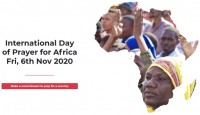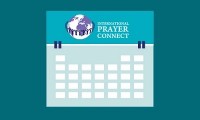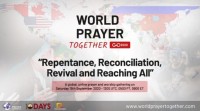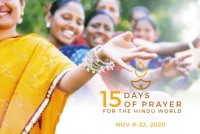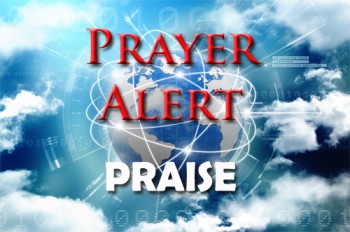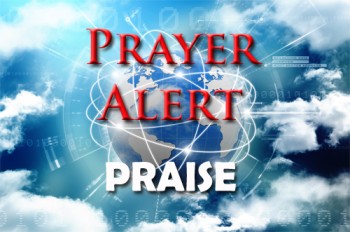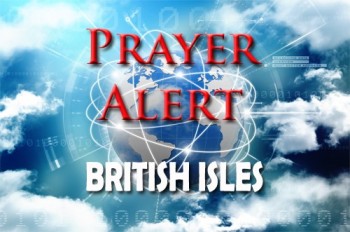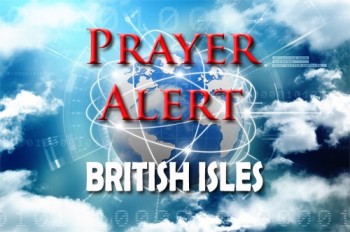Cover Africa in Prayer - from Cairo to Cape Town and from Madagascar to Cape Verde -
As part of the International Day of Prayer for Africa, One God – One Day – One Africa and its partners from all around the world will pray for Africa from 06:00 to 22:00 CAT (Central Africa Time).
We are so excited because a week later the One God – One Day – One Africa celebrations will take place.
On 12-15 November our partners will host large Gospel crusades in almost every country of Africa. They will be broadcast all over the continent. Additionally, thousands of African evangelists committed to bringing the Good News to remote villages during that time.
Join, pray with us!
Set time aside to pray with us on 6 November. Let's storm the heavenly throne room and ask for breakthroughs in every nation of Africa. Let's pray for an end to the pandemic, an outpouring of the Holy Spirit and of course many open hearts to receive Jesus Christ as their Lord and Saviour.
Download Africa Flyer Download International Flyer
Make a commitment to pray for an African country NOW at www.1GDA.org/prayerday
‘Lifting up a fire wall and rampart over Iberoamérica’
Nations are in the midst of a global shakeup, a global hiatus due to the Crisis caused by the Covid-19 Pandemic. Many people in the nations are afraid and look for answers. Now more than ever it is time to pray for people, attend to their needs and share the Gospel in the Nations of the Earth.
We recognize that historical moments of crisis have created the perfect atmospheres for the GREAT REVIVALS and the Uprising of the Great Harvests of souls for our beloved Jesus Christ and the expansion of his Kingdom throughout history.
We believe that this is the moment when the Church must arise and take its role as The mouth, the feet, the hands of the Lord Jesus Christ to respond to a humanity that has no hope, that is in total confusion, and that awaits a resolution of their leaders or rulers.
We are living one of the most important prophetic moments in this decade , we see how in the midst of the shaking of the Nations, in a Global Pause, our precious Holy Spirit is moving strategically, bringing Revival in the midst of families, communities and nations . It is time to complete the Great Commission assigned by our Master. The Harvest is ready in the fields, the Angels have already been sent (Mark 13:39) .
The Latin American Prayer Council (CLAMOR) as part of the World Prayer Council (International Prayer Council) invites you to participate in a continuous Continental Vigil that will begin on April 24, and will be held every last Friday of each month until the end of the year 2020.
We want to agree to pray all the nations of Latin America in UNANIMITY , as a single VOICE; believing that something powerful will begin to happen this April. We will pray that the Redeeming gift of the Father, in the intervention of Jesus Christ and in the power of his Holy Spirit, hears our Prayer, receives our repentance and heals our lands. 2 Chronicles 7: 13-14.
We believe that this is the time of the Resurgence of The Ekklesia, a time to give hope to the needy, to the unreached groups of our continent, of the fulfillment of promises, of the manifestation of His mercy, forgiveness, grace. It is the divine time of the spiritual, economic, political and social restart of our peoples.
We cannot lose the window of opportunity that Covid-19 and the World Crisis is providing us to lift the harvest of souls in the fields that are already ready ... IT'S TIME TO PRAY CONTINENTALLY!
More info and sign-up: https://vigiliaunanime.clamor.global/index.php/en/
2020 a year of evangelism across the UK
https://advance2020.org/
The Gathering - 24-7 Prayer - Oct 30th-31st
https://www.24-7prayer.com/
Hallowed be Your Name – Oct 31st
Praying across the UK for the UK
https://tulips.live/
Standing with America – Nov 3rd, 5am PT
https://watchmen.org/upcoming/2020/11/3/standing-with-america
Contend! - 21 Days of Prayer for Global Mission 4-25 Nov 2020
www.globalmmi.net
International Day of Prayer for Africa – 6 Nov
www.1GDA.org/prayerday
Messiah’s House – First Friday – Nov 6
With Rabbi Eric Teitelman & Jed Robyn
www.reconnectingministries.org
15 Days Prayer for the Hindu World - Nov 8-22
www.pray15days.org
Pray & Fast for Church Planting Movements - Nov 14
https://2414now.net/pray/
Continuous Continental Vigil – (CLAMOR) – Nov 27
https://vigiliaunanime.clamor.global/index.php/en/
The Light has Come – Dec 17th
https://watchmen.org/upcoming/2020/12/17/the-light-has-come
Movement for African National Initiatives – Abidjan, Ivory Coast, 8-12 March 2021
https://maniafrica.com/category/prayers/
UPRising Events Calendar
 UPRISING Chile – November 2020 (Date TBA)
GLOBAL UPRISING Manila, Philippines, Nov 2021
UPRISING Chile – November 2020 (Date TBA)
GLOBAL UPRISING Manila, Philippines, Nov 2021
www.unitedprayerrising.com
UPRISING MINDANAO (Mindanao, Philippines)-- dates TBA
- UPRISING BUKIDNON (Northern Mindanao)
- UPRISING CARAGA (Butuan, Bislig, and Surigao)
- UPRISING DIGOS (Davao Del Sur)
- UPRISING CENTRAL MINDANAO (South Cotabato, Cotabato, Sultan Kudarat, Sarangani, and General Santos)
FB: United Prayer Rising Mindanao
FB: United Prayer Rising North Mindanao
IG: @uprisingmindanao
There have been numerous significant regional and international gatherings over the last few months. We would encourage our partner networks to continue to use these wonderful replays and resources that are available on the YouTube channels listed below. They are a hugely valuable resource!
World Prayer Together on 19th September involved 10,000 people from 123 nations.
The theme of the 4-hour gathering was ‘Repentance, Reconciliation, Revival and Reaching all with His Gospel.’
Watch the 30-minute excerpts video or the replay of the whole event. See the programme guides on YouTube or the IPC Website to quickly find specific items.
 10 Days / The Return - 365 City Events and 155 Locations around the world took part in 10 Days. 4000+ people registered for the 24/7 Global Zoom Prayer Room and 4600+ took the Consecration Challenge.
10 Days / The Return - 365 City Events and 155 Locations around the world took part in 10 Days. 4000+ people registered for the 24/7 Global Zoom Prayer Room and 4600+ took the Consecration Challenge.
Watch the Facebook Live Replays of 10 Days.
100,000 attended The Return in Washington and 10's of Millions watched the simulcast on TV and Online.
See Jonathan Cahn’s prophetic word for America.
Watch the REPLAY of The Return - Download a Return Prayer Guide and More!
 The National Prayer Assembly drew together huge numbers worldwide to an online gathering to pray for America.
The National Prayer Assembly drew together huge numbers worldwide to an online gathering to pray for America.
Let's continue to pray for His deliverance and destiny for the USA during this crucial election season. May the best days for America be in the coming months and years, serving as a blessing from the Lord, not only to its own citizens but to the rest of the world as well!
‘Beyond the Pandemic: Is there any word from the Lord?’ by Rev Dr Clifford Hill
When a pandemic is unleashed, how should Christians respond?
Beyond the Pandemic provides a Biblical view of the contemporary world situation.
It focuses upon what the Biblical prophets called “the deeds of the Lord” – the historical evidence of the activity of God in the life and times of the leaders of Israel and Judah, from Moses to Malachi. This revelation of the nature of God is set alongside contemporary events, providing a prophetic view of God’s purposes in these troubled times.
After years of warnings to our society, which has turned its back on Him, who is both Creator and Sovereign over the world in which we live, we must either repent or face yet worse afflictions; Hill points us to the only effective remedy – God’s word spoken through Isaiah 45:22, “Turn to me and be saved, all the ends of the earth, for I am God and there is no other.”
The Rev. Dr Clifford Hill MA, BD, PhD, Sociologist and Theologian, is a lecturer, preacher and broadcaster who has written over forty books. He is an ordained minister in the Congregational church, has led multi-ethnic congregation in London and continues to exercise pastoral oversight of an inner-city church.
He is editor-in-chief of Prophecy Today UK, which seeks to apply God’s word in the Bible to current affairs and, with his wife, Monica, is joint director of Issachar Ministries which supports Christians in prayer and action.
Beyond the Pandemic is published by Wilberforce Publications and is available to purchase:
CLC bookshop - https://clcbookshops.com/Products/ViewOne.aspx?ProductId=131212&sq=beyond%20the%20pandemic
Amazon - https://www.amazon.co.uk/dp/191612111X/
Find out more at Wilberforce Publications: https://www.wilberforcepublications.co.uk/
Join us November 8th to 22nd 2020 in 15 days of prayer for Hindus all over the world!
The 2020 Hindu Prayer Guide - November 8th – 22nd 2020
The annual Hindu World Prayer Focus is calling Christians and churches worldwide to take 15 days to learn about and pray for our world’s over one billion Hindu friends.
That period also encompasses the significant Hindu Festival of Light (Diwali). The informative prayer guide booklets will help Christians to know how to pray for the people(s) growing up within this major and very diverse world religion.
Diwali (or Deepawali) is known as the Festival of Lights, and is one of the most important annual celebrations for Hindus, lasting about 4-5 days. While (similar to Christmas celebrations in the Christian world) it has historical and religious roots, Hindus celebrate it by lighting and displaying rows of small oil lamps, participating in family gatherings, consuming special sweets and watching fireworks.
It is not our intention with this prayer focus to disparage India or the Hindu religion in any way. We recognize that both are far too complex and too full of great traditions to simply or easily condense, explain or take lightly within a mere booklet.
At the same time, as Christians, we long that all the world’s people(s) will have an opportunity to freely see, hear and understand the grace of God incarnated in Jesus Christ.
To this end we inform ourselves, pray for and want to support opportunities to make that grace known also within the world’s Indian and Hindu communities. Get your copy of the 15 Days Hindu Prayer Guide now and join with us!
15 days | 32 pages | 1,000,000,000 Hindus worldwide
Download the Guide HERE: https://pray15days.org/
Comic Relief reality check
Comic Relief will stop sending celebrities to Africa after criticism that stars like Stacey Dooley were going to Africa as ‘white saviours’. The charity will also stop using images of starving people or critically ill children to portray the continent, it has announced. Instead, its fundraising appeals will be made by local film-makers with a ‘more authentic perspective’. Sir Lenny Henry, who co-founded Comic Relief in 1985, welcomed the move; saying, ‘A lot has changed over Comic Relief's 35 years, and so the way we raise money and talk about the issues and the people we are here to support, must change as well. African people don't want us to tell their stories for them. What they need is more agency, a platform and partnership.’ The films will explore issues including mental health, climate change and forced marriages.
Olympic star’s daughter upheld by faith
‘Volleyball has taught me many valuable life lessons about integrity, hard work and perseverance, but my athletic experiences and lessons learned pale in comparison to my greatest passion, living a life committed to the person of Jesus Christ,’ said Jenny the daughter of 1960 decathlete gold-medal winner Rafer Johnson. Jenny grew up in the world of sports and joined a highly competitive UCLA college programme. ‘When I made it to the collegiate level I was just learning how to own my faith and what it means to have God in my sport, that they’re not separate things’ She had a Christian coach who encouraged her to keep up her Christian testimony. As she accepted the challenge, she got even better at volleyball and became the team captain. Her team won All-Tournament Team honours. Later, she and her partner won the silver medal at the beach volleyball world championships in Marseille.
Christian groups demand 'safe and legal' channel routes
Christian refugee campaigners have demanded that the French and UK governments provide a safe and legal way for people to escape their countries after French authorities said a five-year-old, an eight-year-old and two adults died when their vessel sank off the French coast. The people were trying to cross to the UK, despite 18mph wind gusts. Fifteen people are hospitalised in Calais and Dunkirk. There are ongoing searches for any others caught up in the tragedy. Clare Moseley, who founded the Christian refugee charity Care4Calais, called for the incident to be a ‘wake-up call’ for those in power in the UK and France. She said, ‘We are grieving for the victims; we stand in sympathy and solidarity with their families and friends. It is cruel and horrifying that young children are among the victims.’ Boris Johnson has offered the French authorities support as they investigate the incident.
Free school meals a biblical principle
Steve Chalke has urged the Government to reverse its decision not to extend the free school meals over the holidays until at least Easter. ‘If we believe that we have to provide these children with free school meals, because otherwise they lack the nutrition to be able to grow and thrive and study and succeed during school term times; do we imagine that they can exist on thin air through the six weeks of the summer, or the weeks of Christmas, Easter and half terms? We need to provide a steady ongoing care.’ Currently businesses, local authorities, and community groups have set up to provide thousands of free meals for children in need.

